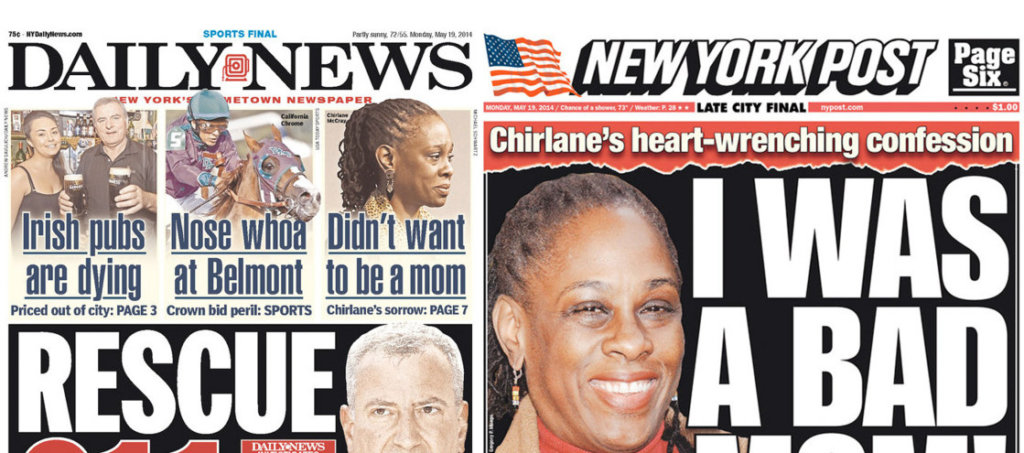And the New York tabs know it. So why does the media still resent women’s success at work and at home?
This article was made possible because of the generous support of DAME members. We urgently need your help to keep publishing. Will you contribute just $5 a month to support our journalism?
This week’s New York magazine cover features Chirlane McCray—wife, partner, and No. 1 adviser of NYC mayor Bill de Blasio. The in-depth cover story calls New York “Chirlane McCray’s city,” focuses on her influence, and underlines the diversity she’s brought to City Hall as a black woman (“of the dozen senior staff the mayor meets with each morning, six are women. Only three are white men. Of the 80 or so commissioners, deputy mayors, and agency heads de Blasio has hired, more than half are women”). But is that what’s fueling the media’s reaction to the story? Of course not. “I was a bad mom,” blares the New York Post headline above McCray’s photo. “Didn’t Want to Be a Mom” screams the Daily News cover. It’s a tale as old as women’s first punch on the time clock: Being a mother must be your full-time job, regardless of the professional role you hold, you have to excel at home and at the office, and you must do it all with a smile on your face. Anything less than the utmost enthusiasm for parenting and you’re nothing more than a cold-hearted bitch, more concerned with yourself than the welfare of your children.
McCray’s comments about motherhood and work life were taken grossly out of context, and merely speaking honestly about the complicated issues that envelop the two is what earned her these misogynist attacks. But the hesitations she touched on likely do more to endear her to working mothers than “horrify” them as the Post suggested. “I was 40 years old. I had a life. Especially with [my older daughter,] Chiara—will we feel guilt forever more? Of course, yes. But the truth is, I could not spend every day with her. I didn’t want to do that. I looked for all kinds of reason not to do it,” McCray said. “I love her. I have thousands of photos of her—every 1-month birthday, 2-month birthday. But I’ve been working since I was 14, and that part of me is me. It took a long time for me to get into ‘I’m taking care of kids,’ and what that means.”
Calling McCray a bad mother in the wake of Chiara’s openness about battling depression and addiction seems particularly cruel. Is anyone blaming de Blasio’s bad fathering for his daughter’s struggles? Will he instead be credited with enabling her strength and perseverance? As Luisita Lopez Torregrosa wrote in the New York Times, “When a man is dedicated to his job or politics, he is respected, but when a woman does the same thing and has kids, she’s a bad mother.” As Jennifer Senior points out at New York mag, the same standard isn’t true for men. “Today, you know who talks eloquently and reassuringly about the tedium of child rearing? Louis C.K. He’s made a cottage industry of it,” writes Senior. “Yet as far as I know, GQ didn’t run the headline ‘I Was a Bad Father,’ on the cover when they named him Man of the Year.”
It’s an allegation we see waged against women in the workplace time and time again, especially in the realm of politics. Just earlier this year, Texas gubernatorial candidate Wendy Davis’s daughters had to publicly come to her defense, when she was painted by the media as a terrible mother for relinquishing primary childrearing duties to their father while she attended law school. “Sadly I feel the need to be crystal clear on the malicious and false charge of abandonment as nothing could be further from the truth,” wrote Davis’s daughter Dru. “My mom has always shared equally in the care and custody of my sister and me.” It’s the “equally” part where things start to sour.
What’s possibly most dangerous about this mentality, however, is the way mothers internalize it. What working mother hasn’t realized she forgot to sign a permission slip, or give her daughter lunch money, or, as Sheryl Sandberg, crusader of career women everywhere, recounts, sent a son to school on St. Patrick’s Day without dressing him in a green shirt, giving fodder to that ever-present mantra: I’m a bad mom. The only way to de-stigmatize this perception is by talking about it. But so far, as clearly evidenced by the reaction to McCray’s story, women aren’t allowed to.
At a press conference yesterday, de Blasio, in what the New York Times called and “unusual and stern rebuke,” asked for an apology: “I think both the Post and the Daily News owe Chirlane—I think they owe all of us—an apology for absolutely misrepresenting what she said and caricaturing a reality that I think so many women face.” More than an apology though, perhaps women deserve a promise: that they will be allowed to express their intricate emotions about finding happiness in both career and motherhood without being vilified for it.
